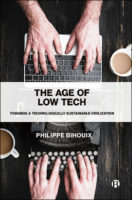The various restrictions that have been imposed to tackle the COVID-19 crisis have led many of us to reflect on what might be our response to other pressing issues that we face, especially inequalities in our societies and the major ecological issues of climate change, biodiversity collapse and resource depletion. What has the crisis told us about the state of our planet and societies, and are there wider lessons that can be learned from our response?
Even before the pandemic, we had begun to talk in public debate in ways that would have been unimaginable ten years ago: about the climate crisis and resilience to ecological disruption, questioning the dogma of growth at all costs. The pandemic has reinforced concerns about globalisation and challenged beliefs about the role of the state and the possibility of printing money in a real emergency, while showing that we could do very well without certain things, such as shopping trips to Dubai or cruise ships. Many of us have learned to value nature more, to seek conviviality and escape from the incessant pressures of modern life, while seeking to build societies that are more resilient to disturbances.
The crisis has further also exposed our societal inequalities in the contrasts between those who were confined in pleasant conditions and others in less fortunate circumstances, between those who could work from home and those who had to stay in their workplaces in order to keep healthcare, food supplies and other essential services operating, and between those who kept getting paid no matter what and those whose earnings dried up.
It is also clear that in many ways the response to the pandemic was rather ‘low tech’, based largely on modifying behaviour rather than on technology. We were treated to a few articles on surveillance drones and robots disinfecting the streets in China, but in the end we addressed the crisis through regulation and behavioural changes: staying at home, wearing masks, washing our hands, keeping a distance. This low-tech remedy is one that could be applied to the environmental challenges that we face.
Using a detailed analysis of humankind’s relationship with resources through history, I suggest, in The Age of Low Tech: Towards a Technologically Sustainable Civilization, an alternative perspective on how we should be marshalling our resources to preserve the planet and secure our future. I believe ‘high’ technology will not solve global problems and propose a different ‘low tech’ approach to building a more resilient, equitable and sustainable society.
How might this be done? We must reinvent our modes of production. In questioning the race for productivity and economies of scale in mega-factories, we should review the place of people in our economies, the degree of mechanization and robotization, and our way of choosing between manpower and resources. It is not about returning to the spinning wheel and draught animals, but about relocating workshops and businesses on a human scale to manufacture durable goods. Equipping these with a few simple and robust machines, we should be able to maintain a good part of current productivity, while reducing energy demand. Such manufacturing units, less productive but more labour-intensive and closer to locations of consumption, would be coupled with arrangements for the recovery, repair, resale and sharing of everyday objects.
With a few priorities – to eat well, take care of ourselves, to find proper accommodation – our ambition should be to produce locally, to be able to manufacture and repair tools, clothes, shoes, everyday objects, to value meaningful work. We will achieve resilience through a variety of actions and behaviours at different scales by individuals through their lifestyle choices, by businesses and public authorities through their purchases at all levels, setting an example and supporting initiatives to develop and support local economies.
In many areas we can drastically reduce our resource and energy needs, for example, in transportation, smaller, lighter and slower cars would have significantly reduced impact, public transport and bicycles even more so. We could reduce the environmental impact of digital systems by over 90% by avoiding duplicated networks and redundant systems; by favouring wired access, which consumes much less energy; by properly designing data centre software and architecture; by giving up the race for speed, real time and immediacy, which consumes a lot of equipment and generates additional traffic; reducing unnecessary functionality and performance; by working on the service life of the equipment, through modularity, ‘repairability’, compatibility and interoperability.
I believe that an alternative exists to our society hell-bent on extraction, production and consumption. What might make people want to contribute to a general movement with conviviality as a priority, with DIY, zero waste, repair shops, local agriculture and regenerated nature? It will be necessary to give the population some immediate compensations, as well as meaning and hope, not just ’blood, sweat and tears‘ or ’belt tightening for future generations’. One avenue is to move towards a post-growth system (economic, industrial, commercial, etc.) of full employment, or full activity, which is perfectly achievable. Power will come from people with convictions that want to make the change, but we also need to convince the public authorities, and businesses at every level, of the urgency of the situation. But it will take a profound rethinking of existing practices, economic models, regulatory approaches, cultural patterns and educational methods to reflect on our real needs and successfully implement intelligent sobriety. We are very far from it.

The Age of Low Tech: Towards a Technologically Sustainable Civilization by Philippe Bihouix is available on the Bristol University Press website.
Teaser photo credit: By Thelmadatter – Own work, Public Domain, https://commons.wikimedia.org/w/index.php?curid=4801542





